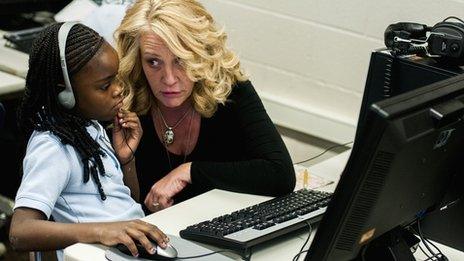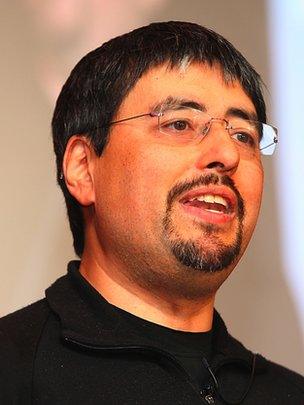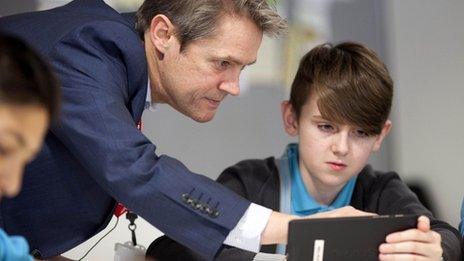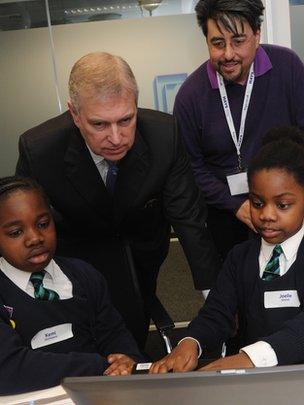Where the only rule is 'be cool'
- Published

Coding clubs are springing up worldwide: Hour of Code event in Michigan, US
How did coding get so cool?
Let's be honest, it wasn't always that way. Being able to speak to computers in their own language wasn't the best way to impress at parties.
But in a world of digital billionaires it has become a deeply fashionable skill. It turns out that it's the geek who is going to inherit the earth.
And one of the fast-growing coding clubs has been CoderDojo.
It's a not-for-profit organisation running coding clubs for young people in 38 countries, with the founding principle that the only rule is: "Be cool."
It is established across Europe and North America, with a few clubs scattered across Asia and South America. Discussions with the US state department could see support for the clubs spreading further into Africa.
Temple of learning
The clubs are run by volunteers, teaching young people how to write code, build websites and make apps. The club's start-up supporters have an almost evangelical enthusiasm for these self-taught, unstructured, unbossy events.
The "dojo" is borrowed from Japanese martial arts, as the temple of learning. It taps into a culture where students are expected to pass on what they have learned to others, with the learners becoming mentors.

Bill Liao wants coding to be a sociable activity
Behind the CoderDojo project is Bill Liao, an entrepreneur and philanthropist who grew up in Australia and now lives in West Cork in Ireland.
Coding is at the heart of the digital world, he says. If you want to understand this world then you need to understand its language.
"Coding is a language skill.
"The best coders I know are poets. They have creativity and economy of expression. You see great code and it is elegant in its simplicity and rich in meaning."
We don't always recognise the beauty of well-made technology, he says, even when it is right in front of us.
"We marvel at a two year old tapping at an iPad using a computer. We should really be marvelling at an Apple engineer who can make a computer that a two year old can use."
Another reason for the upsurge in interest in coding is that it is going to help young people in a tough jobs market.
"Name a field of endeavour where understanding code wouldn't benefit your career choice," says Mr Liao.
Code father
Setting up the CoderDojo clubs, he says surprised him by how much children wanted to learn.
And he was pleasantly surprised by how generous people can be in donating their time and premises.
As an example of how it works on the ground, Rob Curran is a local CoderDojo "champion" in Wilmslow, Cheshire.
Mr Curran came across the project when he brought his own son to a dojo and was so impressed that he now helps run a monthly session which attracts between 30 and 90 youngsters.
They learn how to use coding programmes such as Scratch, or use the simple Raspberry Pi computer or experiment with computer game such as Minecraft.

Will coders be the next generation of App millionaires?
What is the appeal for youngsters? It gives them hours of uninterrupted computer time and importantly, he says: "It is not school."
But the rise of computer clubs doesn't mean that the economy is suddenly awash with youngsters with the right skills.
Mr Liao's day job is as a venture capitalist and he says there are too many bright ideas looking for investors which are held back by a lack of coders.
"The entire world is run on code and we have run out of coders," he says.
As an entrepreneur, he says he wants to create an environment where youngsters can try to learn these skills and not worry about failure.
When they succeed there is instant playground credibility.
A 12 year old attending a CoderDojo club in Cork made a games app that was accepted for Apple's App Store, he says. He was so young his mother had to register the account for him.
Being able to show friends your own app on an iPhone is "achingly cool", he says.
'Hated school'
While the parents might be thinking about the cash advantages of a junior Bill Gates in the family, Mr Liao says such coding clubs have got to be sociable, reassuring and spontaneous places.
What he wants to avoid is the sense of isolation he felt as a child, teaching himself to use a computer in his bedroom in the suburbs of Melbourne.

An introduction to coding event in south London last week
"I hated school. Mostly because I was racially vilified as a half-Chinese kid. It was pretty horrible."
But learning to use a computer was his escape from loneliness and bullying.
"It gave me access to something that has been incredibly powerful throughout my life."
And he says he has great empathy for the lonely child learning alone, wanting them to feel safe in the CoderDojo set up.
"Learning is a social activity. You learn more when you're doing it together."

The Duke of York gave a royal seal approval to coding clubs at a CoderDojo event last week
And as the CoderDojo website puts it: "Bullying, lying, wasting people's time and so on is uncool."
He is also an advocate of the principle of working many years to become an overnight success. He describes his years refining the CoderDojo idea, with co-founder James Whelton, as his "Beatles in Hamburg years".
It isn't just CoderDojo that is surfing the coding wave. There are many other organisations bringing the coding message to young people, such as Code Club and Code Academy.
In the UK, this is the Year of Code, external, with the aim of encouraging more people to try to learn the language.
In the US and the UK there are "hour of code" projects for quick-fire lessons, supported by tech giants such as Microsoft and Google.
The BBC's School Report project has also gathered resources and materials about learning to code.
And even though CoderDojo clubs are spreading around the world, Mr Liao won't be rushing to see them all.
Not because of lack of interest, but because he has given up air-travel as part of an environmental, tree-planting project.
But the idea he wants to plant in all these clubs is to encourage creativity without a fear of failure.
"It's not just free, it's free thinking. It's not closed and institutional," he says.